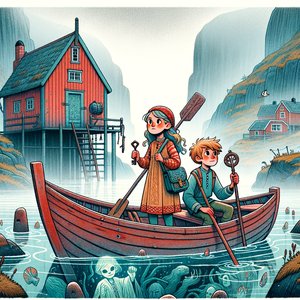Raven Tide

The first frost came to Hrafnvik with a hush. It brushed the turf roofs white and turned the pebbled shore into glittering lace. Edda liked to be up before the smoke lifted from the longhouses. She stood on the slipway with a basket of net weights on her hip, the cold biting her ears, and watched the sea breathe.
Beyond the village, the fjord shone like a silver blade, its edges cut by mountains and birch. Two ravens crossed the pale sky. One cried sharply, as if reminding the world to listen. Boats creaked on their ropes. Someone laughed in a nearby yard. The smell of kelp, woodsmoke and fish made the morning feel ordinary and safe, like a cloak pulled close.
"Edda! Nets!" Tor came trotting from the boathouse with a coil over his shoulder. He was taller by a hand, with hair like tanned rope and a grin he wore whether he deserved it or not.
"They're mended," Edda said. "All but the blue one."
"Grandmother Signe says the blue one catches more than fish," Tor teased. "She says it steals luck from the sea."
"Grandmother Signe says a lot of things," Edda replied, though she liked hearing them. At night, when the wind pressed soft fingers against the shutters, Signe told of longships that flew, of warriors who wore words like armour, of the day the salt-hare raced the tide and lost its whiskers. Edda didn’t always know what to believe, but she kept the stories anyway. They were nets, too, catching what was too slippery to hold.
Their father had sailed south at the end of summer with Jarl Sten’s trading fleet. The prows were stacked with furs and amber. He had promised to return before the first snow with bolts of coloured cloth and sweet-dried apples. The apples had not come, but the snow had. Edda tried not to look east, where the fjord opened to the white sea and everything beyond was a place she had never seen.
They worked without talking for a while, hands stiff in the cold, fingers clever. The blue net was a troublemaker. It snagged where it shouldn’t and knotted itself when no one was looking. When Edda reached for it, her knuckle brushed a splinter in the boathouse post. She hissed and pulled back. The splinter caught on something, and the plank shifted with a tired sigh.
"Tor," she said softly. "Help me."
They knelt by the loosened plank and pried it up. Beneath the floor, straw rustled and drifted, and under the straw lay a lump wrapped in old sealskin. Tor’s grin disappeared. Edda felt the hairs lift along her arms.
Inside the bundle lay a piece of carved ivory, smooth as river stone, long as her hand. Lines wound across it like paths on snow: stars, tiny and precise; the curve of a fjord; the straight strokes of runes. Beside it was an iron key no bigger than a fishhook, but heavier, its bow shaped like a raven with wings outstretched.
Tor whistled. "Well."
Edda traced the runes with her finger. "Raidho. Journey. Fehu. Wealth." These carvings weren’t random scratches. They were a path laid in bone. She lifted the ivory into the light. Hidden grooves shone faintly, like a memory.
"It’s a map," she said.
"To what?" Tor asked.
Edda could not answer. The carved fjord was their own, yet the map showed a cove she had never seen, marked with a single rune like a ripple inside a mouth.
Edda slid the iron key into her palm. It was cold enough to sting. Notches ran along its shank like tide-marks. "Low tide," she whispered.
"Low tide where?" Tor asked.
"Ravensbeak," Edda said, surprising herself.
"Children," came Grandmother Signe’s voice from the doorway. They both jumped. She was small and tidy as driftwood, her grey hair braided with blue yarn, her eyes seal-dark. She lifted the ivory and the key as if greeting old friends.
"Some doors open when the water is right," she said. "Some doors never should."
That afternoon, Edda kept busy to stop herself thinking of the ivory and the iron. By the time the sun balanced low on the mountain rim, the tide drew back. Edda and Tor took the smallest boat. Signe’s extra lantern sat wrapped under the bench.
"Row easy," Edda said. "The cove is there."
They pulled along the shore. Fog licked the rocks in thin tongues. The black rock shaped like a bird’s beak jutted from the cliff, exactly where the ivory said it would be. A narrow passage opened.
Edda reached for the iron key. It warmed in her pocket. When she held it up, the fog swirled aside, showing a strip of water the colour of storm glass.
They eased the boat inside. The cliffs rose close, carved with strange marks. The air smelled of old things: tar, iron, whale breath. The light turned greenish, as if the sea itself glowed. Something flapped, then stilled.
A sound rose from the water, low and steady. Not wave, not wind. Beneath the boat, something moved, brushing the back of a sleeping giant.
The passage widened into a hidden chamber. A long, narrow shadow floated there — a ship. Its dragon-head prow lifted high and still, shields faded to ash along its side.
Tor whispered a word he shouldn’t. Edda touched the iron key to the rim of their boat. The key hummed.
From the dark, something knocked gently against their hull. Then again, harder.
The fog behind them had closed. The passage was gone. In front, the longship’s dragon raised its head, as if it had been waiting.
The iron key grew hot in Edda’s hand as the ship began, slowly, to drift towards them.
Autor zakończenia:

 English
English
 polski
polski
 Co było dalej?
Co było dalej?



